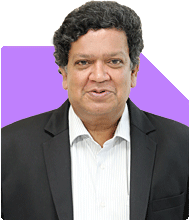Dr Ashit Hegde | Answer |Ask -Follow
Consultant Physician, Internal Medicine and Critical Care Expert - Answered on Sep 23, 2023
He is actively involved in teaching and training residents for post graduate programmes in internal medicine and critical care.
He holds an MD degree in general medicine and therapeutics from the Lokmanya Tilak Municipal Medical College, Mumbai, and an MRCP from the Royal College of Physicians, Edinburgh.... more

Dear Doctor I am 43 years , for last 2 years i am facing a problem that all the time i am afraid of disease. I feel i have a chronic disease and when i go for all the tests, they are normal. Basically in the morning when i woke up i fell this thing much. How should i over come it?
You may like to see similar questions and answers below
Anu Krishna |1746 Answers |Ask -Follow
Relationships Expert, Mind Coach - Answered on Oct 06, 2020
Dr Karthiyayini Mahadevan | Answer |Ask -Follow
General Physician - Answered on May 10, 2023
Dr Karthiyayini Mahadevan | Answer |Ask -Follow
General Physician - Answered on Jul 06, 2024
Dr Rajiv Kovil | Answer |Ask -Follow
Diabetologist - Answered on Jan 22, 2025
Ramalingam Kalirajan |10893 Answers |Ask -Follow
Mutual Funds, Financial Planning Expert - Answered on Dec 15, 2025
Ramalingam Kalirajan |10893 Answers |Ask -Follow
Mutual Funds, Financial Planning Expert - Answered on Dec 15, 2025
Radheshyam Zanwar |6746 Answers |Ask -Follow
MHT-CET, IIT-JEE, NEET-UG Expert - Answered on Dec 15, 2025
Ramalingam Kalirajan |10893 Answers |Ask -Follow
Mutual Funds, Financial Planning Expert - Answered on Dec 15, 2025
Ramalingam Kalirajan |10893 Answers |Ask -Follow
Mutual Funds, Financial Planning Expert - Answered on Dec 15, 2025
Ramalingam Kalirajan |10893 Answers |Ask -Follow
Mutual Funds, Financial Planning Expert - Answered on Dec 15, 2025
Samraat Jadhav |2508 Answers |Ask -Follow
Stock Market Expert - Answered on Dec 15, 2025
Ramalingam Kalirajan |10893 Answers |Ask -Follow
Mutual Funds, Financial Planning Expert - Answered on Dec 15, 2025
Reetika Sharma |425 Answers |Ask -Follow
Financial Planner, MF and Insurance Expert - Answered on Dec 15, 2025
Radheshyam Zanwar |6746 Answers |Ask -Follow
MHT-CET, IIT-JEE, NEET-UG Expert - Answered on Dec 15, 2025



























